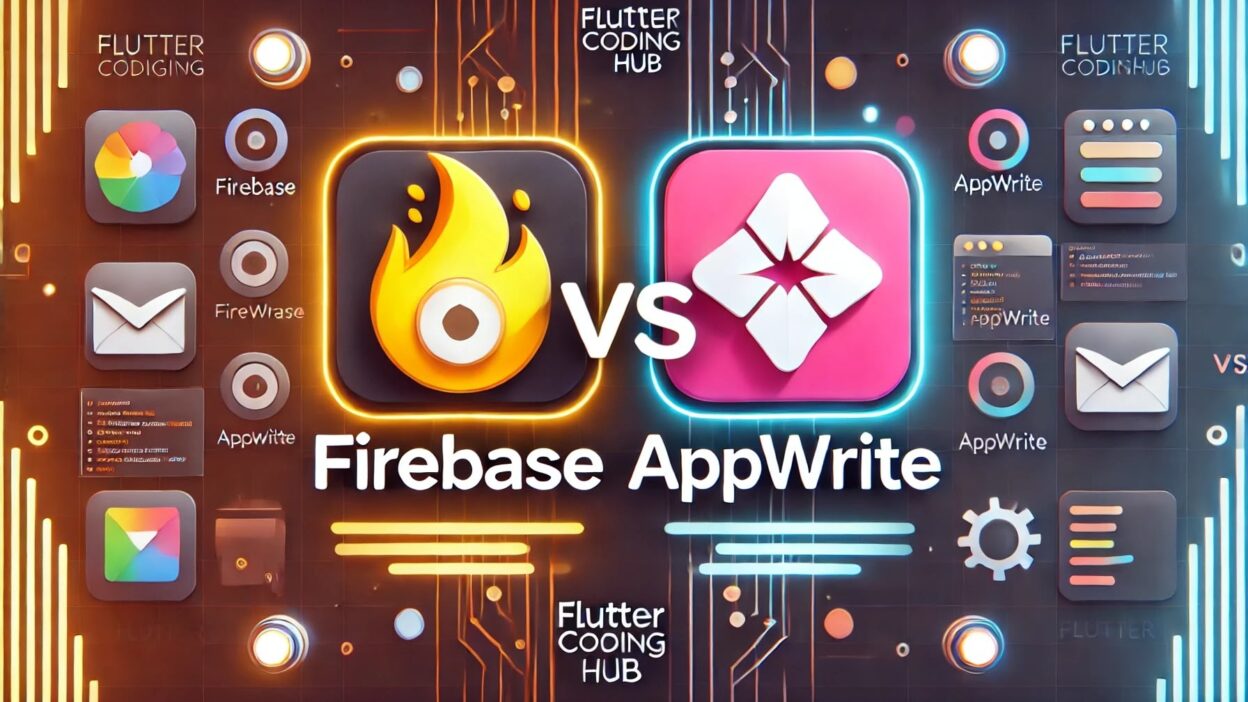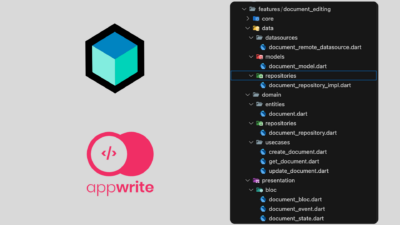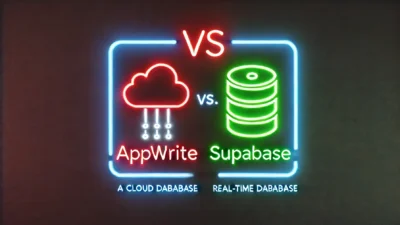Introduction
Selecting the right backend service is a critical decision that can significantly impact your Flutter app’s development timeline, performance, and scalability. Among the many Backend-as-a-Service (BaaS) options available, Firebase and Appwrite have emerged as popular choices for Flutter developers. This article provides an in-depth comparison to help you determine which platform better suits your project requirements.
Overview: Firebase vs Appwrite
| Feature | Firebase | Appwrite |
|---|---|---|
| Ownership | Google (Proprietary) | Open Source |
| Launch | 2011 (Acquired by Google in 2014) | 2019 |
| Core Database | NoSQL (Firestore/Realtime DB) | MariaDB (SQL) |
| Flutter SDK | Mature, comprehensive | Growing, well-documented |
| Hosting | Cloud-only | Self-hosted & Cloud |
| Pricing | Free tier + usage-based | Free (self-hosted), Cloud has free tier + paid plans |
| Auth System | Firebase Auth | Appwrite Auth |
| Realtime Capabilities | Yes | Yes |
| Learning Curve | Moderate | Moderate |
Architecture & Deployment Models
Firebase
Firebase operates exclusively on Google’s cloud infrastructure:
- Fully managed service with no self-hosting option
- Automatic scaling handled by Google
- Limited control over infrastructure
- Regional deployments with multi-region options for enterprise customers
Appwrite
Appwrite offers flexible deployment options:
- Self-hosted on your own infrastructure
- Appwrite Cloud for managed hosting
- Docker-based deployment for easy setup
- Kubernetes support for scaled deployments
// Both services use a similar initialization pattern in Flutter
// Firebase initialization
await Firebase.initializeApp(
options: DefaultFirebaseOptions.currentPlatform,
);
// Appwrite initialization
final appwrite = Client()
.setEndpoint('https://your-appwrite-endpoint.com/v1')
.setProject('your-project-id')
.setSelfSigned(); // For self-hosted with self-signed certificatesDatabase Solutions
Firebase Databases
Firebase offers two database solutions:
- Firestore: Document-based NoSQL database with real-time capabilities
- Realtime Database: JSON-tree structured database optimized for synchronization
// Firestore example in Flutter
final firestore = FirebaseFirestore.instance;
await firestore.collection('tasks').add({
'title': 'Complete Firebase tutorial',
'priority': 'high',
'created': FieldValue.serverTimestamp(),
});
// Query data
final snapshot = await firestore
.collection('tasks')
.where('priority', isEqualTo: 'high')
.get();Appwrite Database
Appwrite uses MariaDB (SQL) but provides an abstraction layer:
- Document-based API over relational database
- Collections and documents terminology (similar to NoSQL)
- Database permissions through custom rules
- Structured data validation
// Appwrite database example in Flutter
final databases = Databases(client);
await databases.createDocument(
databaseId: 'main',
collectionId: 'tasks',
documentId: ID.unique(),
data: {
'title': 'Complete Appwrite tutorial',
'priority': 'high',
'created': DateTime.now().toIso8601String(),
},
);
// Query data
final documents = await databases.listDocuments(
databaseId: 'main',
collectionId: 'tasks',
queries: [
Query.equal('priority', 'high'),
],
);Authentication
Firebase Authentication
Firebase offers comprehensive authentication options:
- Email/password authentication
- Phone number verification
- OAuth providers (Google, Apple, Facebook, Twitter, etc.)
- Anonymous authentication
- Custom authentication systems
- Multi-factor authentication
// Firebase Auth example in Flutter
final auth = FirebaseAuth.instance;
// Sign up
final userCredential = await auth.createUserWithEmailAndPassword(
email: 'us**@ex*****.com',
password: 'securePassword123',
);
// Sign in
final signInCredential = await auth.signInWithEmailAndPassword(
email: 'us**@ex*****.com',
password: 'securePassword123',
);Appwrite Authentication
Appwrite provides similar authentication capabilities:
- Email/password authentication
- Phone authentication
- OAuth social providers
- Magic URL (passwordless)
- Anonymous sessions
- JWT authentication
// Appwrite Auth example in Flutter
final account = Account(client);
// Sign up
final user = await account.create(
userId: ID.unique(),
email: 'us**@ex*****.com',
password: 'securePassword123',
);
// Sign in
final session = await account.createEmailSession(
email: 'us**@ex*****.com',
password: 'securePassword123',
);Storage Capabilities
Firebase Storage
Firebase Storage provides:
- Cloud storage for user-generated content
- Security rules for access control
- Resumable uploads
- Download URLs with optional expiration
- Integration with Firebase Authentication
// Firebase Storage example in Flutter
final storage = FirebaseStorage.instance;
final file = File('path/to/image.jpg');
// Upload file
final taskSnapshot = await storage
.ref('users/${user.uid}/profile.jpg')
.putFile(file);
// Get download URL
final downloadUrl = await taskSnapshot.ref.getDownloadURL();Appwrite Storage
Appwrite Storage offers:
- File storage with buckets
- File preview generation
- Image transformations and optimization
- Fine-grained permissions system
- Files metadata management
// Appwrite Storage example in Flutter
final storage = Storage(client);
final file = File('path/to/image.jpg');
// Upload file
final result = await storage.createFile(
bucketId: 'profiles',
fileId: ID.unique(),
file: InputFile(
path: file.path,
filename: 'profile.jpg',
),
);
// Get file view
final fileView = storage.getFileView(
bucketId: 'profiles',
fileId: result.$id,
);Realtime Capabilities
Firebase Realtime
Firebase has been built with realtime capabilities as a core feature:
- Firestore and Realtime Database offer listeners for data changes
- Efficient sync with automatic conflict resolution
- Offline persistence with automatic reconnection
// Firebase realtime listener example
firestore.collection('chats')
.doc(chatId)
.collection('messages')
.orderBy('timestamp')
.snapshots()
.listen((snapshot) {
for (var doc in snapshot.docs) {
print('New message: ${doc.data()}');
}
});Appwrite Realtime
Appwrite provides realtime capabilities through WebSockets:
- Subscribe to database, storage, authentication events
- Channel-based subscriptions
- Simple API for realtime updates
// Appwrite realtime example
final realtime = Realtime(client);
final subscription = realtime.subscribe([
'databases.main.collections.chats.documents'
]);
subscription.stream.listen((RealtimeMessage message) {
if (message.events.contains('databases.*.collections.*.documents.*.create')) {
print('New message: ${message.payload}');
}
});Functions & Serverless
Firebase Cloud Functions
Firebase offers Cloud Functions for serverless execution:
- Supports Node.js, Python, Go, Java, .NET, Ruby, PHP
- Triggered by Firebase events or HTTP requests
- Integrated with other Firebase services
- Cold start times can be an issue
// Firebase Cloud Function example (Node.js)
exports.processNewUser = functions.auth.user().onCreate((user) => {
return admin.firestore()
.collection('users')
.doc(user.uid)
.set({
email: user.email,
createdAt: admin.firestore.FieldValue.serverTimestamp()
});
});Appwrite Functions
Appwrite Functions provides:
- Supports Node.js, PHP, Python, Ruby, Dart (Flutter’s language!)
- Customizable runtime environments
- Event-based triggers
- Scheduled execution
- Flexible execution environments
// Appwrite Function example (Dart)
void main() {
final res = AppwriteFunction();
res.onInvoke((context) {
final payload = context.req.body;
final userId = payload['userId'];
return {'success': true, 'message': 'User $userId processed'};
});
}Flutter Integration & Developer Experience
Firebase Flutter SDK
The FlutterFire SDK provides:
- Well-maintained official packages
- Comprehensive documentation
- Local emulators for development
- Extensive community support
- Firebase CLI for project management
// Firebase package dependencies
dependencies:
firebase_core: ^2.23.0
firebase_auth: ^4.14.1
cloud_firestore: ^4.13.2
firebase_storage: ^11.5.2Appwrite Flutter SDK
The Appwrite Flutter SDK offers:
- Official Flutter SDK with type safety
- Growing documentation and examples
- Local development setup with Docker
- Active Discord community
- CLI tools for project management
// Appwrite package dependencies
dependencies:
appwrite: ^11.0.0Additional Services
Firebase Ecosystem
Firebase provides a rich ecosystem of additional services:
- Firebase Analytics: User behavior analytics
- Firebase Crashlytics: Crash reporting
- Firebase Performance: App performance monitoring
- Firebase Remote Config: Feature flags and A/B testing
- Firebase Messaging: Push notifications
- Firebase ML: Machine learning capabilities
- Firebase Hosting: Web app hosting
- Firebase App Distribution: Beta testing distribution
Appwrite Ecosystem
Appwrite offers core backend services with growing capabilities:
- Appwrite Teams: User groups and team management
- Appwrite Locale: Internationalization API
- Appwrite Avatars: Avatar and image generation
- Appwrite Health: Service health monitoring
- Appwrite Webhooks: Integration with external services
Security & Permissions
Firebase Security
Firebase security is primarily based on:
- Firebase Security Rules (JSON-like syntax)
- Integration with Firebase Authentication
- Google Cloud IAM for project-level access
- Different rule sets for different services
// Firebase Security Rules example
rules_version = '2';
service cloud.firestore {
match /databases/{database}/documents {
match /users/{userId} {
allow read, write: if request.auth != null && request.auth.uid == userId;
}
}
}Appwrite Security
Appwrite provides a flexible permission system:
- Role-based access control
- Team-based permissions
- API key management
- Custom functions for complex authorization
- JSON-based permission syntax
// Appwrite permissions example
{
"read": ["user:userId"],
"write": ["user:userId"],
"create": ["team:editors"],
"update": ["team:editors"],
"delete": ["team:admins"]
}Pricing Comparison
Firebase Pricing
Firebase uses a tiered pricing model:
- Free tier for development and small apps
- Pay-as-you-go for exceeding free limits
- Costs can scale with usage, potentially unpredictably
- Each service has different pricing metrics
- Enterprise pricing available for large-scale applications
Appwrite Pricing
Appwrite offers flexible pricing options:
- Free for self-hosted deployments (infrastructure costs apply)
- Appwrite Cloud has a free tier for small projects
- Predictable pricing tiers based on usage
- Enterprise support options available
- No vendor lock-in due to self-hosting option
When to Choose Firebase for Flutter
Firebase might be the better choice when:
- You need a fully managed service without infrastructure concerns
- Your app requires advanced analytics and crash reporting
- Google ecosystem integration is important
- You prefer NoSQL database flexibility
- Your app has simple to moderate data querying needs
- Budget allows for potential scale-based cost increases
- You need enterprise-level support and SLAs
When to Choose Appwrite for Flutter
Appwrite could be preferable when:
- You want an open-source solution with no vendor lock-in
- Self-hosting or data sovereignty is a requirement
- SQL database capabilities are needed for complex queries
- You prefer predictable pricing or cost control
- You want to use Dart for your serverless functions
- Your team values an active, community-driven approach
- Privacy concerns or regulatory requirements restrict cloud usage
Performance Considerations
Firebase Performance
- Globally distributed infrastructure
- Automatic scaling handled by Google
- Cold starts can affect Cloud Functions
- Network latency depends on region configuration
- Query performance depends on index setup
Appwrite Performance
- Performance depends on your hosting setup
- Self-hosted gives more control over infrastructure
- Appwrite Cloud provides managed scaling
- SQL database can be optimized for complex queries
- Docker-based architecture affects resource usage
Migration Path
Firebase to Appwrite
Migrating from Firebase to Appwrite requires:
- Data structure conversion (NoSQL to SQL)
- Authentication system migration
- Storage file transfer
- Security rules translation
- Appwrite provides some migration tools
Appwrite to Firebase
Moving from Appwrite to Firebase involves:
- Database schema conversion to NoSQL model
- Authentication data migration
- Storage transfer
- Functions rewriting
- No official migration tools currently exist
Community & Support
Firebase Community
- Large, established community
- Extensive Stack Overflow presence
- Official Google support channels
- Enterprise support plans
- Many third-party tutorials and courses
Appwrite Community
- Active, growing open-source community
- Responsive Discord server
- GitHub issues for support
- Community-driven documentation
- Contributing opportunities
Flutter-Specific Considerations
Firebase Flutter Integration
- Native integration with iOS and Android
- Web support maturing
- Desktop support improving
- Flutter Favorite packages
- Comprehensive error handling
Appwrite Flutter Integration
- Single SDK across platforms
- Consistent API for web, mobile, and desktop
- Native Flutter package (not a wrapper)
- Growing example repository
- Flutter-first approach to development
Conclusion
Both Firebase and Appwrite offer powerful backend solutions for Flutter developers, but with different approaches and philosophies. Firebase provides a comprehensive, fully managed ecosystem backed by Google’s infrastructure, while Appwrite offers an open-source alternative with flexibility in deployment options and a growing feature set.
For established projects or teams already integrated with Google services, Firebase remains a strong choice. For developers prioritizing data ownership, open-source values, or specific deployment requirements, Appwrite presents a compelling alternative that’s rapidly gaining traction in the Flutter community.
The right choice ultimately depends on your specific project requirements, team expertise, budget constraints, and long-term vision. Many developers even use a hybrid approach, leveraging specific services from each platform where they excel.
As Flutter continues to evolve, both Firebase and Appwrite are likely to enhance their Flutter support, making





